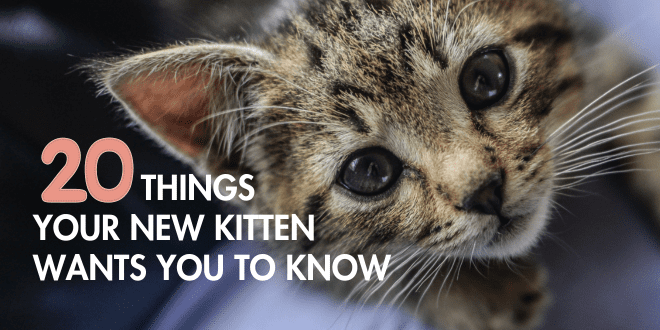
If there’s a new kitten in your life, it may seem overwhelming at first as you figure out what supplies you need, how to get to know the furry new family member and how to keep thim healthy, safe and happy. If your new cat could talk, there’s a good chance these are the kind of tips he’d give you about his needs:
1. Don’t declaw me. My claws are a vital part of my physical and emotional health. To remove my claws is the equivalent of amputation of the first joint of your own fingers. I should matter more than your furniture. Very often, the reason I end up scratching the furniture is because I don’t have a good scratching post. I need something tall, sturdy and covered in a rough material such as sisal. I’d also like the post conveniently located so I can easily get to it when I have the need to scratch.
2. Help me become comfortable with people. I may be timid at first but with patience, kindness and humane training, I can blossom. What you teach me while I’m a kitten will have a lasting effect when I am fully grown. I’m a social animal but I’ll need your help in gradually exposing me to people and experiences to raise my comfort level.
3. I am an obligate carnivore. It’s not a want, it’s a need. You may be a vegetarian but I must receive protein from meat sources. Please feed me good quality food.
4. I should be neutered. It will reduce my desire to roam, will help avoid behavior problems, reduce the risk of certain cancers, and make me a better companion to you. There are also way too many cats out there without homes who are dying in shelters or on the streets. I don’t want to add to the number of unwanted cats.
5. I can be trained. You may have believed only dogs could be trained but I’m smart and willing to learn. Take the time to understand what I need and how to best communicate with me. I respond to humane, positive methods of training.
6. I have a few extremely important requests concerning my litter box. Please keep it clean because I’m a very clean animal. It’s very stressful to have to use a dirty box. I also need a box that’s the right size for me. Don’t ask me to wedge myself into a small or covered box just because you want to fit it into a particular location. Also, if I’m going to be living with other cats in your home, please have enough litter boxes.
7. I am safest indoors. With environmental enrichment, you can provide all the stimulation and fun that outside life provides without any of the dangers.
8. I need regular veterinary care. Even if I never go outside, I need to be kept up-to-date on vaccinations and parasite prevention. Please make sure I visit the veterinarian on a regular basis.
9. As a cat, I am good at hiding illness and pain. Many times the best clue you’ll receive indicating something may be medically wrong is that I’ll display a change in normal behavior. I’m counting on you to notice these things and get me to the veterinarian.
10. Despite what you may have believed, I don’t misbehave out of spite. Please don’t punish me because it sends a message that I should be afraid of you. Take the time to provide what I need as a cat and train me using humane and kind methods.
11. It’s healthier for me to be fed on a schedule. Don’t leave a mountain of food available for me all day because that’s not how cats normally eat. I do best eating several small meals per day. Talk to the veterinarian about how much I should be eating each day.
12. Play with me every day. Playtime is good for me physically, mentally and emotionally. Interactive playtime with you is one of the best ways for us to learn to trust each other and develop a stronger bond. Playtime will also help me grow into a more confident cat.
13. I need vertical territory. I love to climb so please provide a strong and sturdy cat tree for me. I also feel most secure when I’m able to be on an elevated location, especially when I nap. A cat tree with comfortable perches, window perches or even cat shelves will give me places to sleep and also places to look out over my territory.
14. I need some hiding places. There are times when I may not want to be in the center of things or may just prefer to be “invisible” if things in the home get a little hectic. To be able to retreat to a hiding place will allow me to better cope with my anxiety or fear.
15. If, at some point, you decide I need to have a feline friend, please help us get to know each other slowly. I am a territorial animal and I need to feel as if my home is safe. Please don’t just place another cat in my environment. Take the time to ease us both through this transition in a positive way.
16. Increase the chances of me getting safely returned to you if I get lost by having me microchipped. It’s something the veterinarian can do and only takes a few seconds.
17. Teach me to become comfortable with my carrier and to tolerate travel. It will make trips to the veterinary clinic much less stressful for both of us.
18. Don’t leave me alone when you go out of town. Many people think cats can easily stay alone for days as long as they have a bowl filled with food. Many things can happen where I could get hurt or sick. I may also experience separation anxiety from the sudden disappearance of my family. For my safety, and for your peace of mind, please hire a reliable and caring pet sitter or have a trusted friend check on me a couple of times per day. Being left alone can be very scary.
19. I’m an excellent communicator. Take the time to learn to read my body language signals and we can avoid many misunderstandings. Some of my signals may be subtle but others will be very obvious. I’m a good teacher if you take the time to learn.
20. And finally, I need to be a permanent member of your family. As a kitten, I’m adorably cute but please don’t change your feelings for me as I mature. I’m not disposable. I need and deserve a loving forever home.
Need More Information About Cat Training and Behavior?
If you have a new kitty in your family or are thinking of getting one, take the time to learn about what cats need. For more information on cat behavior and training, refer to the best-selling books by Pam Johnson-Bennett. Pam’s books are available at bookstores and online. We’ve included Amazon links here on our website.
If you have a question about your cat’s behavior or health, contact your veterinarian. This article is not intended as a medical diagnosis nor is it a replacement for your cat’s regular veterinary care. This article is for general information purposes only.
 Problem Solving & Advice by Pam Johnson-Bennett Cat Behavior Expert & Best-selling Author
Problem Solving & Advice by Pam Johnson-Bennett Cat Behavior Expert & Best-selling Author





